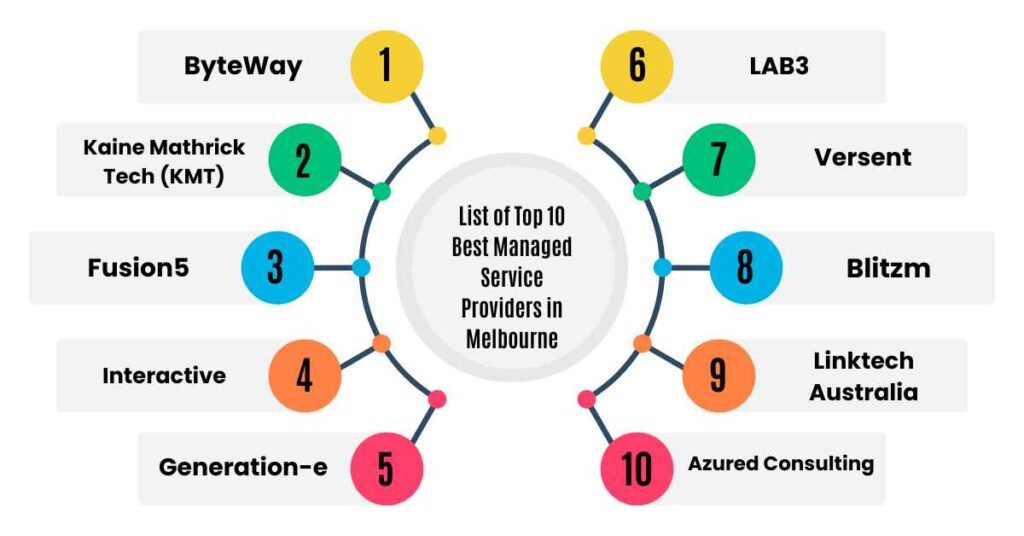As such, the firms in Melbourne find themselves under increased pressure to develop strong and secure IT infrastructures in an environment where technology changes at breakneck speed while competing with core business capabilities. MSPs come to their rescue at this juncture.
By outsourcing IT requirements to seasoned experts, business enterprises can experience massive efficiency and cost-cutting savings, ultimately improving their market positioning. Here’s a review of the top ten MSPs in Melbourne that explain their specialisms and unique selling points.
List of Top 10 Best Managed Service Providers in Melbourne

Here is the list of the top 10 best managed service providers in Melbourne:
1. ByteWay
ByteWay stands as one of the best-managed service providers in Melbourne. It has gained recognition due to its broad IT solutions, which are designed especially for business purposes across diverse industries. By understanding the local market in Australia and having the success of its customers in mind, ByteWay has built up a strong brand as an adviser and a technological partner for both small and big organizations.
Key Strength:
- Proactive and Predictive Maintenance: ByteWay proactively manages IT using a proactive approach aimed at preventing potential problems that may negatively impact business activities. Using state-of-the-art monitoring and analytics tools, they proactively mitigate vulnerabilities that may eventually cause downtimes, ensuring that systems operate at the optimal level.
Full-Service Offerings: ByteWay delivers all the following services:
- Cloud Computing: A hassle-free move and subsequent management of cloud infrastructure like AWS, Azure, and Google Cloud.
- Cybersecurity: Effective security solution services include threat detection and response, endpoint protection, and data loss prevention against critical business data leakage.
- Network Infrastructure: Designs, builds, and maintains secure and high-performance Wi-Fi, LAN, and WAN infrastructures.
- IT Support: The services will provide 24/7/365 help desk, remote assistance, and on-site support to ensure business continuity.
- Data Backup and Recovery: Data backup and disaster recovery solutions for the protection of critical business data from unexpected events.
- Customer-Centric Approach: ByteWay builds strong, long-term relationships with its customers. Their highly experienced IT professionals offer personalized service, customized solutions, and continuity support for every business’s unique requirements.
- Technology Expertise: ByteWay stays at the leading edge of technology advances, always growing its expertise and offerings of service in such a way that clients get the latest and best IT solutions possible.
2. Kaine Mathrick Tech (KMT)
Kaine Mathrick Tech is an Australian leader in Managed Services and Cybersecurity solutions. They deliver IT infrastructure services that enable efficient and secure modern workplaces.
3. Fusion5
Fusion5 provides the full range of digital innovation solutions, including cloud and managed services, to help businesses thrive in the digital age.
4. Interactive
Interactive is a leading provider of Cloud and Managed Services, Data Centre, and Business Continuity solutions.
5. Generation-e
Gene is one of the foremost Australian authorities for unified communications and cloud technologies, coming up with business solutions that assure smooth and effortless business communication.
6. LAB3
The challenger specializes in state-of-the-art IT management services and is recognized for its provision of cutting-edge solutions.
7. Versent
Versent is an Aussie-born technology consultant specializing in offering cloud-native solutions aimed at helping firms harness the prowess of cloud-based technologies.
8. Blitzm
Blitzm is one of the leading managed service providers in Melbourne, providing a full range of services to support your business throughout its life cycle.
9. Linktech Australia
Linktech Australia helps businesses get the most from technology through expert guidance and support across a full range of IT solutions.
10. Azured Consulting
Azured Consulting specializes in Microsoft Cloud solutions; helping the business unlock the power of Azure to improve efficiency and productivity.
Top 5 Things to Consider Before Choosing a Managed Service Provider in Melbourne

This is a critical decision that may influence the success of your business, and you have to consider the following five factors when choosing an MSP:
- Service Scope and Specialisations: Identify the specific needs of your IT system and what it requires. Research those MSPs who specialize in your industry and in services you are interested in (such as cloud computing, cybersecurity, and data backup).
- Service Level Agreements (SLAs): Take the time to review the SLAs that potential MSPs provide. Ensure they match your business’s specific needs in terms of response times, availability, and service quality.
- Compare pricing models and contract terms from different MSPs: Ensure that flexible and transparent pricing options are accommodated within budget constraints.
- Security Posture and Compliance: Ask about the MSP’s security measures and compliance certifications, for example, ISO 27001 and SOC 2. Make sure they have best-in-class security practices in place to protect your sensitive data.
- Customer References and Reviews: Ask previous clients for references and read other reviews online in order to determine the reputation and satisfaction of a customer with that MSP.
Summary
Here is the summary of the blog titled “Top 10 Best Managed Service Providers in Melbourne“
- ByteWay
- Kaine Mathrick Tech (KMT)
- Fusion5
- Interactive
- Generation-e
- LAB3
- Versent
- CyberCX
- Linktech Australia
- Azured Consulting
Conclusion
The right Managed Service Provider can make all the difference for businesses in Melbourne. It is possible to choose a partner that will help you optimize your IT infrastructure, improve security, and drive business growth by carefully evaluating your needs and considering the factors above.
FAQs
Q. What are the main advantages of using a managed service provider?
Ans. There are several significant advantages to utilizing a Managed Service Provider, which include efficiency and productivity in allowing the offloading of day-to-day IT tasks so that your internal team is freed up to concentrate on core business objectives. Proactive monitoring and response to threats improve security and reduce cyberattacks and data breaches. IT costs are predictable, thus ensuring cost savings and minimal capital expenditures on hardware and software. Scalability and flexibility are improved for easy response to changing business needs with scalable IT solutions. Lastly, there is a factor of access to the expertise where you get to utilize the experience and knowledge of professional IT professionals.
Q. How do I choose the best MSP for my business?
Ans. In selecting the appropriate MSP, first of all, one needs to define clearly one’s IT requirements and budget and then research various MSPs to compare their services, expertise, and pricing. Client testimonials and case studies need to be requested and reviewed. Appointments should be taken with shortlisted MSPs to discuss requirements and ask all relevant questions. One should carefully read and negotiate the SLAs with them to match your specific requirements.
Q. What are the common types of managed services?
Ans. Common types of Managed Services are generally Cloud Computing, cyber security, network infrastructure, IT Support, Data Backup and Recovery.
Q. How much does an MSP cost to hire?
Ans. Cost models for an MSP vary highly, depending on the scope of services being requested, your business size, and the degree of complexity your IT environment demands. The main pricing models offered are fixed monthly fees, pay-per-use, and project-based pricing. Quotes from several different MSPs are needed, which should be compared when making a selection.
Q. What should one look for while evaluating the security posture of an MSP?
Ans. Look for certifications in data security such as ISO 27001, SOC 2, and HIPAA. Know what security features they have; their firewalls, intrusion detection systems, and encryption. Know what measures they follow to handle incidents related to breaches and data, and whether their staff receives regular training on good cyber practices.




